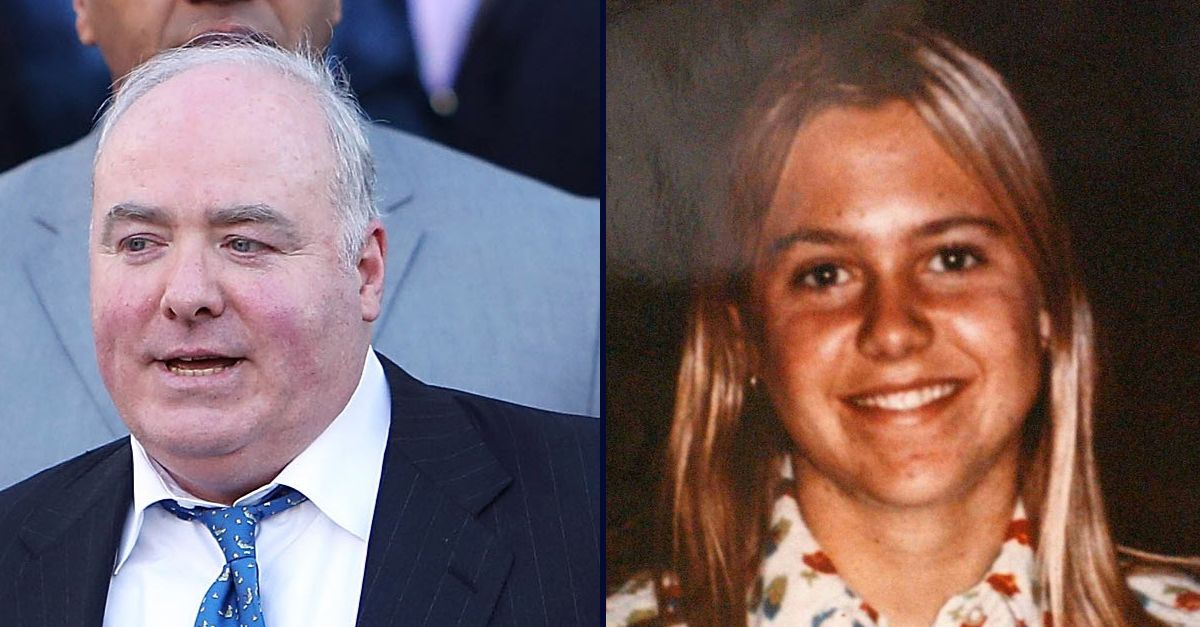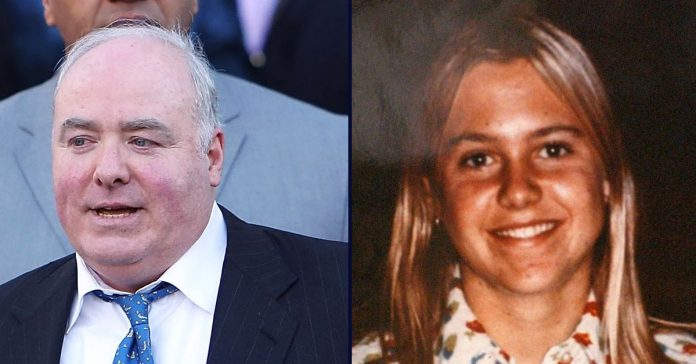
STAMFORD, CT — NOVEMBER 21: Kennedy relative Michael Skakel, left, walks out of a Stamford, Connecticut courthouse after his murder conviction in the death of Martha Moxley, right, was vacated when a judge decided he did not receive adequate representation in his 2002 trial on November 21, 2013, in Stamford, Connecticut. (Photo by Spencer Platt/Getty Images; Evidence Photo of Martha Moxley via Getty Images)
Kennedy family cousin Michael Skakel alleges in a new lawsuit that authorities withheld evidence leading to his imprisonment for more than a decade after his wrongful conviction for the murder of 15-year-old Martha Moxley in 1975 in Connecticut.
Skakel’s lawsuit, which names the town of Greenwich, its police department and the investigator, Frank Garr, as defendants, alleges that they “conspired, assisted and/or otherwise acted jointly and/or in concert with one or more of each of the aforementioned others” to violate Skakel’s civil rights.
“For a sensationalized ‘Kennedy Cousin’ murder he didn’t commit, he was given 11 and a half years of his life in jail,” his attorney Stephan Seeger told the local newspaper Greenwich Time.
“Try picking up where you left off under that dark cloud,” the defense lawyer said. “Of course, it’s not something he can walk away from — why would anybody? It’s time the untold stories on the road to wrongful conviction are heard, and it’s time those responsible are held accountable. That’s what the civil rights case is all about.”
Lawyers for the defendants did not immediately respond to Law&Crime’s requests for comment. A spokesperson for Garr’s attorney declined to comment, citing the pending litigation.
The lawsuit said that authorities had exculpatory evidence, including composite sketches from an eyewitness that identified a potential suspect who did not resemble Skakel and various psychological profile reports of prospective suspects — Skakel’s brother Thomas Skakel and another person. Police also had statements from witnesses saying two males were in Greenwich near the murder scene on the night of the murder and that “one or both of the two men, who knew the victim, had a crush on her, and had expressed intentions to go ‘caveman’ on somebody,” court documents said.
Two hairs found near the victim’s body or the blanket that the victim’s body was wrapped in bore African American and Asian characteristics that matched the ethnic characteristics of the males, the lawsuit said.
It also alleged Garr held a deep antipathy toward Skakel and the Skakel family and was resentful of former Los Angeles police detective Mark Fuhrman, touted as the man who solved the murder by implicating him in his book “Murder in Greenwich,” while Garr believed he should have been recognized for his investigative work.
The lawsuit said exculpatory and favorable evidence was “intentionally withheld from MS and his trial attorneys, all in spite of the same having been requested by the defense in the discovery process or it having been subject to other legally binding obligations to turn the same over to the Plaintiff’s defense team.”
The lawsuit said Garr persuaded a now-dead heroin addict with a long-standing resentment toward Skakel to testify that Skakel had confessed to the murder while he and Skakel were incarcerated at a youth facility known for its “violent and unorthodox behavior modification and/or therapeutic methods.”
“Garr knew of Coleman’s complete lack of credibility from statements made by Coleman’s own lawyer,” the complaint said.
Garr also allegedly reached out to another potential witness at the facility, promising him a reward for testifying against Skakel and “coerced and tricked him into testifying that, among other things, the plaintiff may have blacked out during the evening of the murder” even though Garr received information before trial that the witness was a liar and could not be trusted.
The lawsuit said Garr knew both people were “untruthful and incompetent witnesses by way of their inconsistent stories, penchant for reward monies available and drug addictions, however, they were nonetheless placed before the grand jury and/or the court in proceedings against MS,” the complaint said.
Garr also threatened other witnesses to make the case against Skakel, warning one to answer his questions, “or his life would be made difficult,” the lawsuit said.
“As a direct and proximate result of said wrongful and malicious prosecution against him, plaintiff has been caused to suffer and sustain injuries and losses,” the complaint said.
As Law&Crime reported in 2020, Martha’s murder might forever be an open question, at least where the law is concerned. Prosecutor Richard Colangelo, chief state’s attorney for Connecticut, told a judge in 2020 that he would not retry Skakel, according to The Hartford Courant. Colangelo said the state cannot prove the case beyond a reasonable doubt.
The prosecutor mentioned that 17 out of 51 potential prosecution witnesses had passed away since the original trial and that investigators could not find new evidence.
The announcement arrived 45 years to the day that Moxley was beaten to death with a golf club that allegedly belonged to the defendant’s late mother. Skakel, then also 15, was convicted of murder in 2002.
Skakel’s defense continued to fight the conviction, however. Finally, a judge ordered a retrial in 2013 after Skakel’s team argued his trial attorney provided inadequate representation.
Thus began a roller-coaster ride that lasted until today.
The Connecticut Supreme Court reinstated Skakel’s conviction in 2016 in a 5-4 decision. However, one of the judges ended up retiring and being replaced. The case ended up in the Connecticut Supreme Court again. The court ruled 5-4 for a second time — but this time to toss the conviction.
Skakel is related to the Kennedy political dynasty by marriage. His aunt married Robert F. Kennedy.
Law&Crime’s Alberto Luperon contributed to this report.
Have a tip we should know? [email protected]

